-
 Bitcoin
Bitcoin $112400
-1.07% -
 Ethereum
Ethereum $3409
-3.27% -
 XRP
XRP $2.784
-6.60% -
 Tether USDt
Tether USDt $0.9997
-0.03% -
 BNB
BNB $739.3
-2.09% -
 Solana
Solana $158.0
-2.90% -
 USDC
USDC $0.9998
-0.02% -
 TRON
TRON $0.3213
-0.94% -
 Dogecoin
Dogecoin $0.1929
-5.01% -
 Cardano
Cardano $0.6974
-2.82% -
 Hyperliquid
Hyperliquid $36.69
-2.31% -
 Sui
Sui $3.327
-4.80% -
 Stellar
Stellar $0.3672
-5.18% -
 Chainlink
Chainlink $15.65
-3.07% -
 Bitcoin Cash
Bitcoin Cash $525.0
-1.68% -
 Hedera
Hedera $0.2291
-6.00% -
 Avalanche
Avalanche $20.91
-2.96% -
 Ethena USDe
Ethena USDe $1.000
0.00% -
 Toncoin
Toncoin $3.520
-1.12% -
 UNUS SED LEO
UNUS SED LEO $8.968
0.14% -
 Litecoin
Litecoin $105.7
0.26% -
 Shiba Inu
Shiba Inu $0.00001181
-1.79% -
 Polkadot
Polkadot $3.492
-2.08% -
 Uniswap
Uniswap $8.800
-3.10% -
 Dai
Dai $0.9999
-0.01% -
 Monero
Monero $289.9
-3.17% -
 Bitget Token
Bitget Token $4.243
-1.27% -
 Pepe
Pepe $0.00001006
-3.67% -
 Cronos
Cronos $0.1248
-5.68% -
 Aave
Aave $249.7
-2.50%
how to buy bitcoin spot etf
Bitcoin spot ETFs offer regulated Bitcoin exposure, but availability depends on your brokerage and location; purchasing involves finding a suitable broker, opening/accessing your account, searching for the ETF ticker, placing an order, and funding your account.
Mar 22, 2025 at 02:43 am
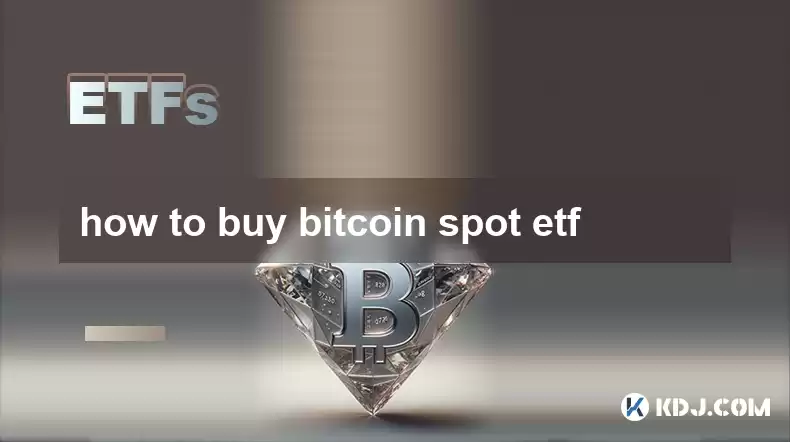
How to Buy Bitcoin Spot ETFs
The launch of Bitcoin spot ETFs (Exchange-Traded Funds) marks a significant milestone for the cryptocurrency industry, offering investors a more regulated and accessible way to gain exposure to Bitcoin's price movements. However, the process of buying them can still be slightly nuanced depending on your location and brokerage. This article details how to navigate the process.
Understanding Bitcoin Spot ETFs
Unlike Bitcoin futures ETFs, which track Bitcoin futures contracts, spot ETFs directly hold Bitcoin. This means their price more closely reflects the actual price of Bitcoin on exchanges. This direct exposure can be attractive to investors seeking a simpler and potentially more efficient way to invest in Bitcoin. However, regulatory approvals are crucial, and availability varies significantly by region.
Where to Buy Bitcoin Spot ETFs
The availability of Bitcoin spot ETFs is heavily dependent on regulatory approvals in your jurisdiction. If approved in your country, you can typically purchase them through your existing brokerage account. Many established brokerage firms, both online and traditional, will list them alongside other ETFs once they are approved and available for trading. Check your brokerage's website for a list of available ETFs. If your brokerage doesn't offer it, you may need to consider transferring to a brokerage that does.
Steps to Buy a Bitcoin Spot ETF
- Find a Brokerage: First, identify a reputable brokerage that offers the specific Bitcoin spot ETF you wish to buy. Ensure the brokerage is regulated and licensed in your jurisdiction.
- Open or Access Your Account: If you don't already have an account, you'll need to open one with the chosen brokerage. This usually involves providing personal information and completing identity verification. If you already have an account, log in.
- Search for the ETF: Use the brokerage's search function to locate the Bitcoin spot ETF ticker symbol. This symbol will be unique to each ETF and will be provided by the issuer.
- Place Your Order: Once you've found the ETF, specify the number of shares you want to buy and place a market order or a limit order, depending on your desired price and risk tolerance. A market order buys at the current market price, while a limit order only executes if the price reaches your specified limit.
- Fund Your Account: Ensure you have sufficient funds in your brokerage account to cover the purchase price of the ETF, including any commissions or fees.
- Review Your Purchase: After placing your order, review your transaction history to confirm the purchase was successfully executed.
Considerations When Buying Bitcoin Spot ETFs
- Fees: Be aware of any brokerage fees, commission charges, and expense ratios associated with the ETF. These fees can impact your overall returns.
- Regulatory Landscape: The regulatory landscape surrounding cryptocurrencies is constantly evolving. Stay informed about any changes that may affect the ETF's trading or your investment.
- Market Volatility: Bitcoin's price is inherently volatile. Investing in a Bitcoin spot ETF exposes you to this volatility. Only invest what you can afford to lose.
- Tax Implications: Understand the tax implications of investing in Bitcoin spot ETFs in your jurisdiction. Consult with a tax professional if needed.
Understanding the Risks
Investing in any cryptocurrency-related asset, including Bitcoin spot ETFs, carries inherent risks. The price of Bitcoin can fluctuate dramatically in short periods, potentially leading to significant losses. Regulatory uncertainty also poses a risk. Thoroughly research the ETF and its underlying asset before investing.
Frequently Asked Questions
Q: What is a Bitcoin Spot ETF?
A: A Bitcoin spot ETF is an exchange-traded fund that directly invests in Bitcoin, tracking its price movements closely. Unlike futures ETFs, it doesn't rely on derivatives.
Q: Are Bitcoin Spot ETFs safer than directly buying Bitcoin?
A: Bitcoin spot ETFs offer a degree of added security through regulatory oversight and the established structure of an ETF. However, they still carry the risk associated with Bitcoin's price volatility.
Q: Where can I find a list of available Bitcoin Spot ETFs?
A: Check the websites of major brokerage firms in your region. The availability of these ETFs is geographically dependent due to varying regulatory approvals.
Q: What are the fees associated with Bitcoin Spot ETFs?
A: Fees vary depending on the specific ETF and brokerage. These include expense ratios, brokerage commissions, and potentially other trading fees. Always check the ETF's prospectus and your brokerage's fee schedule.
Q: How do I sell my Bitcoin Spot ETF shares?
A: Selling your ETF shares is similar to buying them. You simply place a sell order through your brokerage account, specifying the number of shares you want to sell.
Q: Are Bitcoin Spot ETFs suitable for all investors?
A: No. Bitcoin spot ETFs are relatively high-risk investments due to Bitcoin's price volatility. They are generally only suitable for investors with a high-risk tolerance and a good understanding of the cryptocurrency market.
Q: What are the tax implications of investing in Bitcoin Spot ETFs?
A: Tax implications vary depending on your jurisdiction. Capital gains taxes may apply when you sell your ETF shares at a profit. Consult a tax professional for personalized advice.
Q: What is the difference between a Bitcoin Spot ETF and a Bitcoin Futures ETF?
A: A Bitcoin Spot ETF directly holds Bitcoin, while a Bitcoin Futures ETF tracks Bitcoin futures contracts. Spot ETFs are generally considered to have a more direct correlation to the actual price of Bitcoin.
Disclaimer:info@kdj.com
The information provided is not trading advice. kdj.com does not assume any responsibility for any investments made based on the information provided in this article. Cryptocurrencies are highly volatile and it is highly recommended that you invest with caution after thorough research!
If you believe that the content used on this website infringes your copyright, please contact us immediately (info@kdj.com) and we will delete it promptly.
- BlockDAG, SEI, Ethena: Top Crypto Performers Under the Microscope
- 2025-08-03 10:50:16
- Bitcoin Blasts Past $119K: How Institutional Adoption and Macro Shifts Fuel the Fire
- 2025-08-03 10:55:16
- Crypto, Grok, and August: Decoding the Latest Trends and Insights
- 2025-08-03 11:10:16
- Crypto, Phishing, and Your Wallet: A New Yorker's Guide to Staying Safe
- 2025-08-03 10:30:16
- Troller Cat Meme Coin Presale Soars: A New King in the Crypto Jungle?
- 2025-08-03 10:30:16
- Grayscale, Altcoin Trust, and Mid-Cap Mania: What's the Deal?
- 2025-08-03 08:50:16
Related knowledge
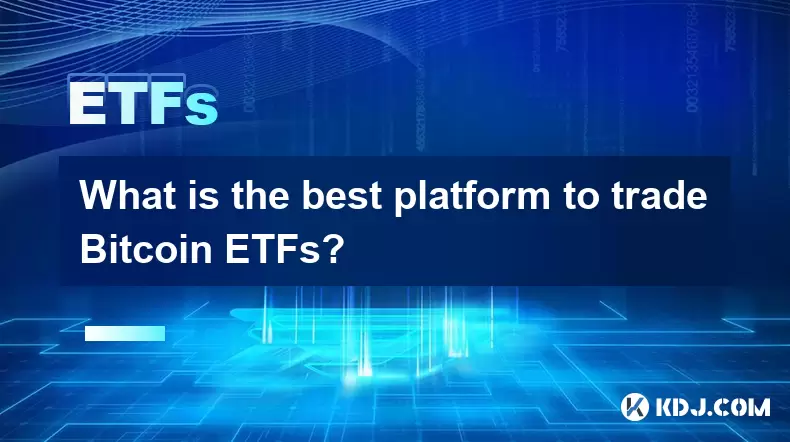
What is the best platform to trade Bitcoin ETFs?
Jul 23,2025 at 04:14am
Understanding Bitcoin ETFs and Their Role in TradingBitcoin Exchange-Traded Funds (ETFs) have gained significant traction among traditional and crypto...
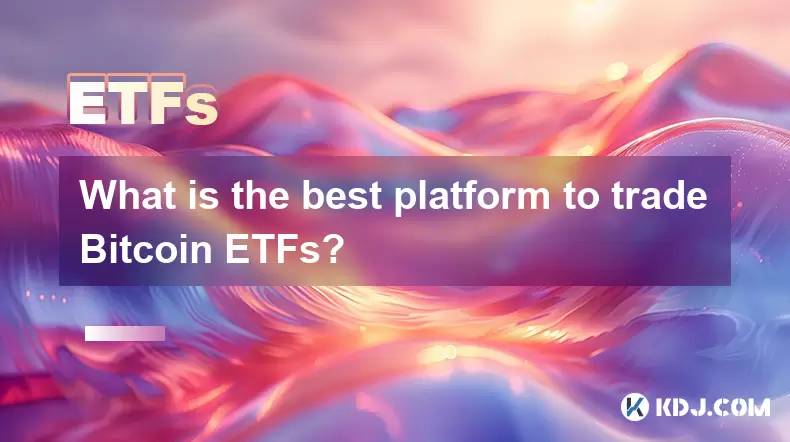
What is the best platform to trade Bitcoin ETFs?
Jul 17,2025 at 03:50pm
Understanding Bitcoin ETFs and Their Role in the MarketBitcoin Exchange-Traded Funds (ETFs) are investment vehicles that track the price of Bitcoin wi...
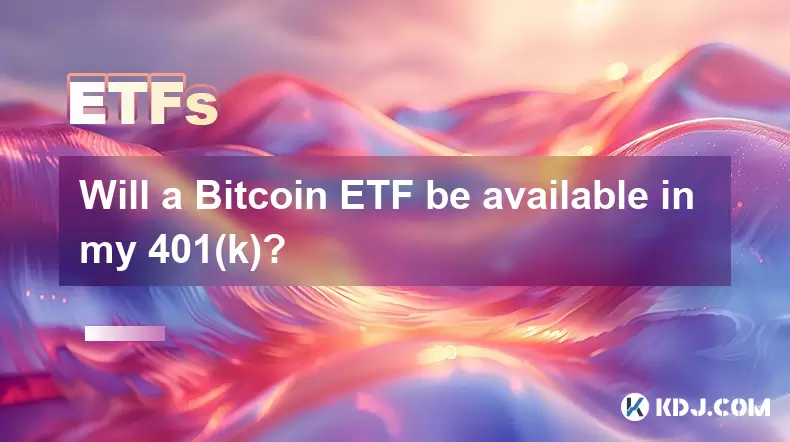
Will a Bitcoin ETF be available in my 401(k)?
Jul 17,2025 at 10:42pm
What is a Bitcoin ETF?A Bitcoin ETF (Exchange-Traded Fund) is an investment vehicle that tracks the price of Bitcoin without requiring investors to di...
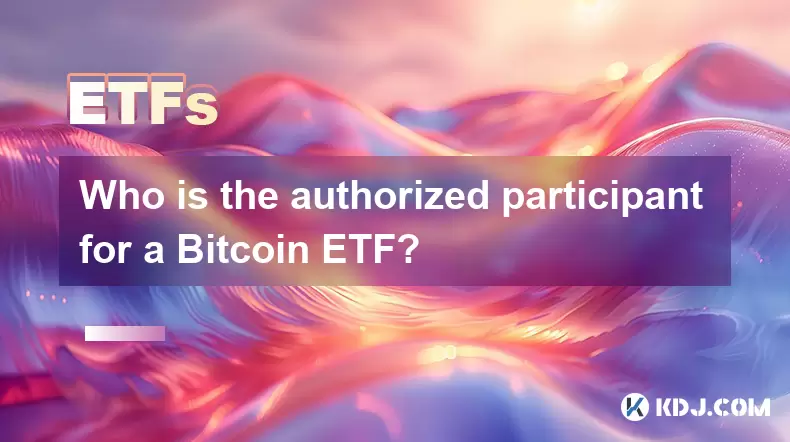
Who is the authorized participant for a Bitcoin ETF?
Jul 18,2025 at 12:42am
Understanding the Role of Authorized Participants in Bitcoin ETFsIn the context of Bitcoin Exchange-Traded Funds (ETFs), an authorized participant (AP...
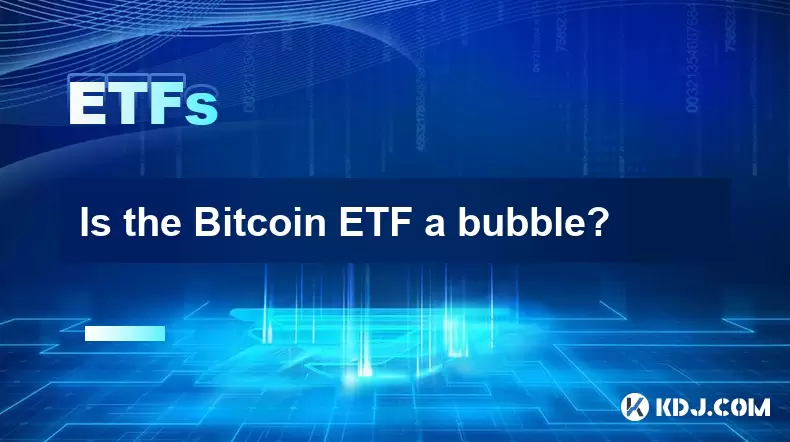
Is the Bitcoin ETF a bubble?
Jul 20,2025 at 06:57am
Understanding the Bitcoin ETF ConceptA Bitcoin Exchange-Traded Fund (ETF) is a financial product that aims to track the price of Bitcoin without requi...
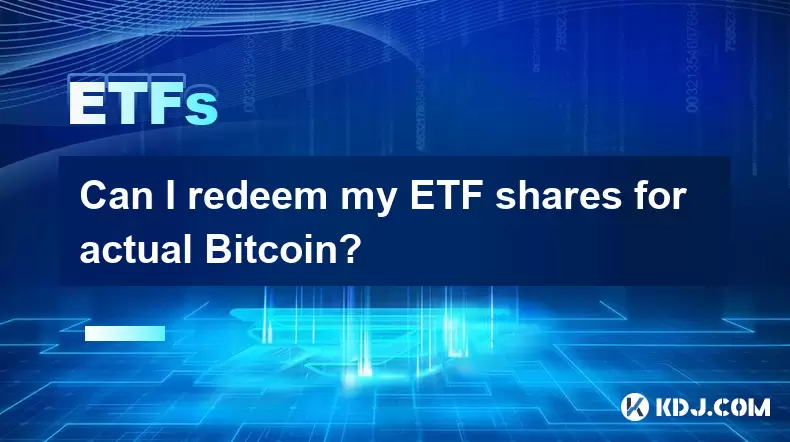
Can I redeem my ETF shares for actual Bitcoin?
Jul 17,2025 at 03:14pm
Understanding ETF Shares and Their Relation to BitcoinExchange-Traded Funds (ETFs) have become a popular investment vehicle for those looking to gain ...

What is the best platform to trade Bitcoin ETFs?
Jul 23,2025 at 04:14am
Understanding Bitcoin ETFs and Their Role in TradingBitcoin Exchange-Traded Funds (ETFs) have gained significant traction among traditional and crypto...

What is the best platform to trade Bitcoin ETFs?
Jul 17,2025 at 03:50pm
Understanding Bitcoin ETFs and Their Role in the MarketBitcoin Exchange-Traded Funds (ETFs) are investment vehicles that track the price of Bitcoin wi...

Will a Bitcoin ETF be available in my 401(k)?
Jul 17,2025 at 10:42pm
What is a Bitcoin ETF?A Bitcoin ETF (Exchange-Traded Fund) is an investment vehicle that tracks the price of Bitcoin without requiring investors to di...

Who is the authorized participant for a Bitcoin ETF?
Jul 18,2025 at 12:42am
Understanding the Role of Authorized Participants in Bitcoin ETFsIn the context of Bitcoin Exchange-Traded Funds (ETFs), an authorized participant (AP...

Is the Bitcoin ETF a bubble?
Jul 20,2025 at 06:57am
Understanding the Bitcoin ETF ConceptA Bitcoin Exchange-Traded Fund (ETF) is a financial product that aims to track the price of Bitcoin without requi...

Can I redeem my ETF shares for actual Bitcoin?
Jul 17,2025 at 03:14pm
Understanding ETF Shares and Their Relation to BitcoinExchange-Traded Funds (ETFs) have become a popular investment vehicle for those looking to gain ...
See all articles

























































































